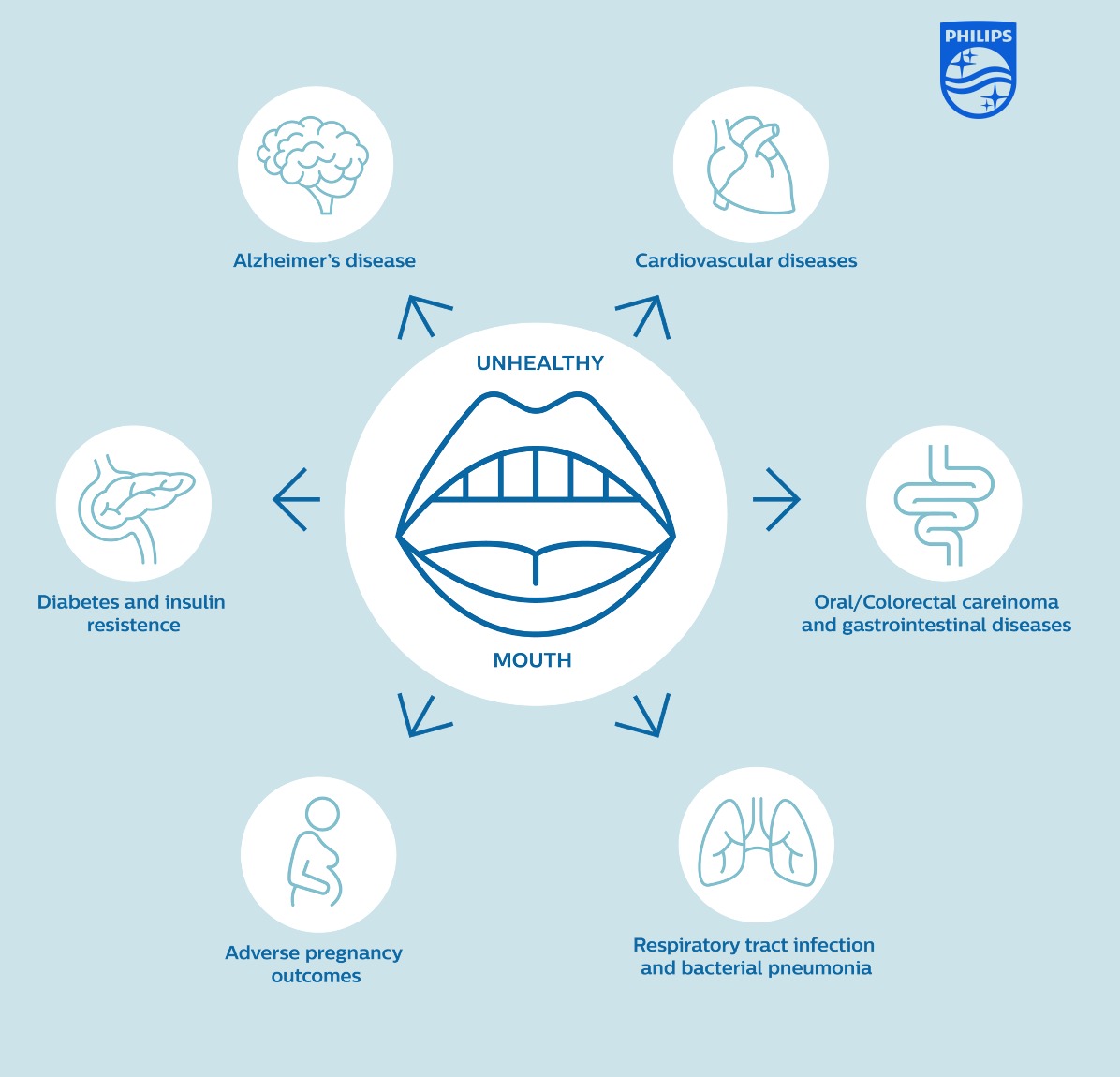3 reasons why oral health is key to your wellbeing
Aug 23, 2022 - Reading time 3-5 minutes
If you discovered a ritual that took about 10 minutes per day could improve your physical, mental and social wellbeing, would you be interested to learn more? It turns out there is such a thing – a good oral hygiene routine.
You probably know that regular brushing and flossing, combined with regular dental visits, helps your smile stay bright and healthy. It makes sense that caring for your teeth and gums keeps them in tip-top shape. What’s less commonly known is that good oral hygiene (also known as dental hygiene) is important for your health and wellbeing in three other vital ways.
1. Oral health supports physical health
The World Health Organization note that oral health is closely linked with overall health, wellbeing and quality of life [1]. Poor oral health is associated with various health conditions [2], including:

Tooth decay and gum disease sometimes result in tooth loss, which can make chewing and swallowing more difficult. This may make it harder for you to get enough nutrition, which can negatively impact your overall health and worsen any existing health conditions.
Many of the conditions that negatively impact oral health – including tooth decay and gum disease – are largely preventable [3].
On the flipside, good oral health helps ensure you get all the nutrients you need to stay healthy and reduces your risk of several health conditions.
If you’re into fitness, it may also help you perform at your peak. A 2020 review of 11 articles discovered a relationship between oral condition and physical fitness, body balance and heart and lung function, as well as cognitive function [4].
Furthermore, oral health is linked with longevity, with studies finding people who keep more teeth tend to live longer [5,6].
2. Oral health fosters mental wellbeing
Oral health is also linked to mental wellbeing. Because dental disease can impact your appearance and speech, it can have a negative effect on self-esteem and confidence.
This link has been highlighted by research. One study of over 1,000 adolescents aged 10 to 17 years found dental disorders (including tooth loss and untreated decay) had a profound impact on their appearance and psychosocial behaviour, thus affecting their self-esteem [7].
Similar results have been found in adults. Insurance company Cigna conducted a survey of 1,000 people aged 18 years and over [8]. They found 91% of respondents who said their oral health was excellent reported their self-confidence was excellent or very good. In contrast, only 37% of those who rated their oral health as fair or poor reported excellent or very good self-confidence.
Furthermore, people with an existing mental health condition are more likely to experience poor oral health [9]. This makes it especially important for them to have access to quality dental care and any tools and support they need to look after their oral health.
Oral health supports social wellbeing
The effects of poor oral health on physical and mental wellbeing can also lead to reduced participation in home, school, work and other social settings [2]. For example, the Cigna survey found 21% of respondents felt less confident about job interviews because of their smile or state of oral health, while 12% believed these held them back from getting a job or promotion.
Good oral health sets you up for social inclusion and participation, which is also vital for wellbeing.
Quick tips to get the most from your oral healthcare routine
It’s clear that good oral health supports wellbeing on several levels. The best news is that a few simple strategies built into your daily routine can help you maintain a healthy, bright smile – for life!
The Australian Dental Association [10] advises you should:
Brush with confidence
The way you brush your teeth can impact how effectively it works. It’s important to brush all over your teeth and onto the area where your gums and teeth meet. Pressure should be adequate to clean your teeth while being gentle enough for your gums.
At Philips, we want to help you adopt good habits and easily take charge of your oral health at home. Our advanced personalised solutions are developed to not only help you enjoy a beautiful smile now, but also because a healthy mouth may mean fewer health-related issues for you in the future.
Check out our resource centre for more tips to help you develop and maintain an oral hygiene routine
[1] https://www.who.int/health-topics/oral-health# [2] https://www.aihw.gov.au/reports/dental-oral-health/oral-health-and-dental-care-in-australia/contents/introduction [3] https://www.who.int/news-room/fact-sheets/detail/oral-health [4] https://www.ncbi.nlm.nih.gov/pmc/articles/PMC7182722/ [5] https://onlinelibrary.wiley.com/doi/10.1111/prd.12128 [6] https://pubmed.ncbi.nlm.nih.gov/32307825/ [7] https://www.ncbi.nlm.nih.gov/pmc/articles/PMC5449896/ [8] https://images.connecting.cigna.com/Web/CIGNACorporation/%7B1068fec3-a6d7-48c1-9664 05ccebba3710%7D_930138_Self_Esteem_Article_Dental_flyer.pdf [9] https://www.ncbi.nlm.nih.gov/pmc/articles/PMC4841282/ [10] https://www.teeth.org.au/dental-health-week
Stay up to date and subscribe
Sign up to stay informed and receive information on healthcare innovation, straight to your inbox






